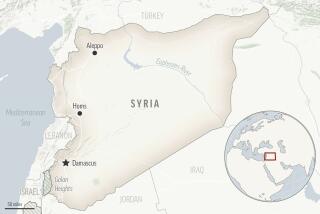Key Al Qaeda in Iraq figure slain in U.S. raid
- Share via
BAGHDAD — U.S. forces raided a cluster of buildings and killed the chief propagandist for Al Qaeda in Iraq, a key figure in the abductions of journalist Jill Carroll and slain peace activist Tom Fox, the military said Thursday.
A coalition of Sunni Arab insurgent groups that includes Al Qaeda in Iraq confirmed the death of Muharib Abdul Latif Jubouri on its website, saying he had been “martyred” in a clash.
The raid Tuesday near Taji, north of Baghdad, capped a six-day U.S. offensive, dubbed Operation Rat Trap, aimed at Al Qaeda-related targets in several cities. U.S. officials recently have shifted blame for most of the country’s violence from Shiite Muslim militias to Sunni Muslim insurgents loyal to Al Qaeda. They accuse the insurgents of stepping up their activities in hopes of fueling sectarian warfare and derailing a U.S.-Iraqi security plan.
Since the security plan’s launch in mid-February, groups linked to Al Qaeda have claimed responsibility for several high-profile attacks, including a suicide bombing that killed nine U.S. soldiers and a blast that killed a lawmaker in the Iraqi parliament building.
Violence again struck in the heavily fortified Green Zone, where parliament is located, this week when rockets killed four civilian contractors, the U.S. Embassy reported Thursday. The victims of the attack Wednesday were a Filipino, two Indians and a Nepali, the embassy said in a statement.
It was the latest in a string of attacks, including the parliament blast, that have exposed the vulnerabilities of the walled enclave where U.S. and Iraqi government offices are located.
At least seven Iraqis died Thursday in mortar and gunfire attacks across the country, and police reported finding the bodies of 25 Iraqi men around Baghdad. All had been shot, and appeared to be victims of sectarian death squads.
Army Maj. Gen. William B. Caldwell IV, the chief U.S. military spokesman, said Jubouri and four associates were killed when they resisted attempts by U.S. troops to detain them during a raid at 2 a.m. Tuesday. Caldwell described Jubouri as a key player in the abduction of Carroll, a Christian Science Monitor reporter kidnapped in January 2006 and held for 82 days before being released.
“He was responsible for the transportation and movement of Jill Carroll from her various hiding places,” Caldwell said. “He was responsible for the propaganda and ransom videos.”
Jubouri was believed to be the last person to have custody of Fox, who was kidnapped in November 2005 and discovered dead the following March.
Jubouri was captured in 2003 by U.S.-led forces, but released in 2004. He settled with his family in Syria before returning last year in September to become minister of information for the Islamic State of Iraq, a self-proclaimed parallel government established by Al Qaeda in Iraq, officials say.
The announcement of Jubouri’s death put to rest a flurry of confusing reports about the death of a leading insurgent.
After the Tuesday raid, Iraqi officials first announced that Abu Ayyub Masri, the leader of Al Qaeda in Iraq, had been killed. Later, it said the dead man was Abu Omar Baghdadi, head of the Islamic State of Iraq.
U.S. officials say the confusion stemmed from rumors that circulated before they had positively identified who had been killed in the raid. A lack of communication after identifying Jabouri then sparked the second erroneous report, they said.
After DNA testing confirmed that the dead man was Jubouri, U.S. officials released the body to a member of his tribe for transport to his home village for burial. Iraqi police, not knowing that Jubouri’s body had just been released, seized the corpse at a checkpoint and announced that they had a “high-value” suspect in their possession, Caldwell said.
Hours later, the confusion was resolved when U.S. officials realized that the Iraqis had Jubouri’s body. The corpse was then released again.
Even as Caldwell spoke Thursday at a news briefing, Iraqi television was showing pictures of a bloated corpse and identifying it as the body of Baghdadi. Caldwell suggested that Baghdadi might not even exist. “We’re not really sure who that [Baghdadi] is,” he said. “There’s a lot of discussion about a person called Al-Baghdadi, but we absolutely have no knowledge of who that might be.”
In the last month, U.S. and Iraqi forces have conducted raids on 139 alleged Al Qaeda sites, killing 87 suspects and arresting 465, he said.
“Due to the significant number of these operations and the large number that have been killed and captured, it became evident that there is some confusion out there to understand exactly who may have been killed or captured.”
*
susman@latimes.com
Special correspondents in Hillah and Baghdad contributed to this report.
More to Read
Sign up for Essential California
The most important California stories and recommendations in your inbox every morning.
You may occasionally receive promotional content from the Los Angeles Times.














